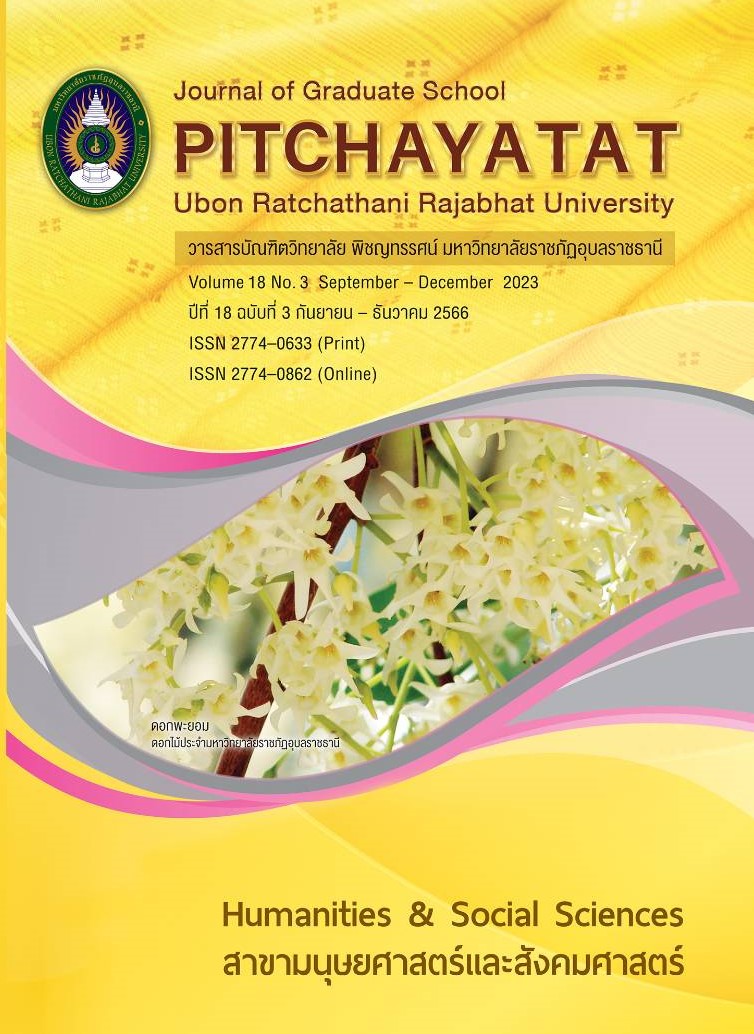ความสัมพันธ์ด้านทักษะมนุษยสัมพันธ์ของผู้บริหารสถานศึกษากับการมีส่วนร่วม ในการบริหารงานสถานศึกษา สังกัดสำนักงานเขตพื้นที่ การศึกษาประถมศึกษาศรีสะเกษ เขต 3
คำสำคัญ:
ทักษะมนุษยสัมพันธ์ , ทักษะของผู้นำแห่งศตวรรษที่ 21 ของผู้บริหารสถานศึกษา , การมีส่วนร่วม , การบริหารงานสถานศึกษา , สำนักงานเขตพื้นที่การศึกษาประถมศึกษาศรีสะเกษ เขต 3บทคัดย่อ
การวิจัยนี้มีวัตถุประสงค์เพื่อ 1) ศึกษาระดับทักษะมนุษยสัมพันธ์ของผู้บริหารสถานศึกษาและการมีส่วนร่วมในการบริหารงานสถานศึกษา สังกัดสำนักงานเขตพื้นที่การศึกษาประถมศึกษาศรีสะเกษ เขต 3 2) ศึกษาความสัมพันธ์ระหว่างทักษะมนุษยสัมพันธ์ของผู้บริหารสถานศึกษากับการมีส่วนร่วมในการบริหารงานสถานศึกษา สังกัดสำนักงานเขตพื้นที่การศึกษาประถมศึกษาศรีสะเกษ เขต 3 และ 3) เสนอแนวทางการเสริมสร้างทักษะมนุษยสัมพันธ์และการมีส่วนร่วมในการบริหารของผู้บริหารสถานศึกษา สังกัดสำนักงานเขตพื้นที่การศึกษาประถมศึกษาศรีสะเกษ เขต 3 ตัวอย่างที่ใช้ในการวิจัยครั้งนี้ ได้แก่ ผู้บริหาร และครูในสถานศึกษา สังกัด สำนักงานเขตพื้นที่การศึกษาประถมศึกษาศรีสะเกษ เขต 3 ประจำปีการศึกษา 2564 จำนวน 339 คน โดยใช้ตารางกำหนดขนาดตัวอย่างของเครจ์ซี่และมอร์แกน ตัวอย่างได้มาโดยการสุ่มแบบแบ่งชั้นตามสัดส่วนและสุ่มตัวอย่างง่าย เครื่องมือที่ใช้ ได้แก่ แบบสอบถามเกี่ยวกับทักษะมนุษยสัมพันธ์ของผู้บริหารสถานศึกษา และการมีส่วนร่วมในการบริหารงานสถานศึกษา สถิติที่ใช้ ได้แก่ ค่าเฉลี่ย ส่วนเบี่ยงเบนมาตรฐาน และการวิเคราะห์สหสัมพันธ์เพียร์สัน
ผลการวิจัยพบว่า
- ทักษะมนุษยสัมพันธ์ของผู้บริหารสถานศึกษาสังกัด สำนักงานเขตพื้นที่การศึกษาประถมศึกษา ศรีสะเกษ เขต 3 โดยภาพรวมระดับมาก และการมีส่วนร่วมในการบริหารงานสถานศึกษาของครู โดยภาพรวมระดับมาก
- ความสัมพันธ์ระหว่างทักษะมนุษยสัมพันธ์ของผู้บริหารสถานศึกษา (y) กับการมีส่วนร่วมในการบริหารงานสถานศึกษา สังกัดสำนักงานเขตพื้นที่การศึกษาประถมศึกษาศรีสะเกษ เขต 3 (x) ในภาพรวมและรายด้าน มีความสัมพันธ์กันในทิศทางเชิงบวกในระดับปานกลาง (r = 0.531) อย่างมีนัยสำคัญทางสถิติที่ .01
- ข้อเสนอแนวทางการเสริมสร้างทักษะมนุษยสัมพันธ์ 1) ผู้บริหารต้องมีความรู้ความสามารถในการบริหาร มีบุคลิกดีเหมาะสมกับผู้บริหาร การวางตัวเป็นกลาง 2) มีวิสัยทัศน์ที่กว้างไกลและวางตัวเป็นกลาง มีคุณธรรม ยอมรับฟังข้อเสนอแนะของผู้ร่วมงานและให้คำปรึกษา 3) รับฟังความคิดเห็นของผู้ใต้บังคับบัญชา ต้องใจกว้างยกย่องชมเชยผู้ร่วมงาน และข้อเสนอแนวทางการมีส่วนร่วมในการบริหารงานสถานศึกษาของครู 1) สถานศึกษาเปิดโอกาสให้ผู้ที่มีส่วนเกี่ยวข้องได้มีส่วนร่วมในการแสดงความคิดเห็น การตัดสินใจ การรับผิดชอบ การวางแผน 2) ครูควรมีส่วนร่วมในการทำงานด้านการเงินและพัสดุ ทำการจัดสรรงบประมาณให้เหมาะสมต่อโครงการต่าง ๆ 3) ครูควรมีส่วนร่วมในการประเมินผลการปฏิบัติงานของบุคลากรทางการศึกษาของสถานศึกษาเพื่อให้ไปในทิศทางที่ดี มีส่วนร่วมในการพิจารณาเลื่อนขั้นเงินเดือน 4) ครูควรมีส่วนร่วมในการการวางแผนระดมจัดหาเทคโนโลยีเพื่อพัฒนาระบบข้อมูลสารสนเทศ
เอกสารอ้างอิง
ขุนทอง สุขทวี. “มนุษยสัมพันธ์ของผู้บริหารที่ส่งผลต่อการบริหารงานโรงเรียนมัธยมศึกษาสังกัดองค์การบริหารส่วนจังหวัดศรีสะเกษ.” วารสารวิชาการมหาวิทยาลัยราชภัฏศรีสะเกษ. 13, 2 (พฤษภาคม-สิงหาคม 2562): 35-44.
ชนิดา จิตตรุทธะ. วัฒนธรรมองค์การ ปัจจัยสู่ความสำเร็จที่ยั่งยืน. กรุงเทพฯ: สำนักพิมพ์แห่งจุฬาลงกรณ์มหาวิทยาลัย, 2560.
ชูชาติ พ่วงสมจิตร์. “การสร้างความสัมพันธ์ระหว่างโรงเรียนกับชุมชน.” วารสารมนุษยศาสตร์ สังคมศาสตร์ และศิลปะ. 10, 2 (พฤษภาคม-สิงหาคม 2560): 1342-1354.
พัชรี นมัสสนิท. การมีส่วนร่วมของครูผู้สอนในการบริหารสถานศึกษา สังกัดสำนักงานเขตพื้นที่การศึกษาประถมศึกษาจันทบุรี. วิทยานิพนธ์ครุศาสตรมหาบัณฑิต มหาวิทยาลัยราชภัฏรำไพพรรณี, 2560.
วิชชุดา หุ่นวิไล. การบริหารบุคคลทางการศึกษา. กรุงเทพฯ: สถาบันราชภัฏสวนสุนันทา, 2542.
อัศวรินทร์ แก่นจันทร์. การมีส่วนร่วมในการบริหารงานวิชาการของครูในโรงเรียนสังกัดองค์กรปกครองส่วนท้องถิ่น. วิทยานิพนธ์ครุศาสตรมหาบัณฑิต มหาวิทยาลัยราชภัฏวไลยอลงกรณ์, 2562.
Argyris, Chris. On Organizational Learning. Second Edition: Blackwell Publishing, 1999.
Brown, J A C. The Social Psychology of Industry: Human Relations in the Factory. Pelican: Penguin Books Limited, 1954.
Krejcie, R.V. and D.W. Morgan. “Determining Sample Size for Research Activities.” Educational and Psychological Measurement. 30, 3 (1970): 607-610.
Serena, Smith. Application on Human Relations Theory in Primary Schools. Norderstedt Germany: GRIN Verlag, 2017.
Zaleznik, A. “The human dilemmas of leadership.” Harvard Business Review. 41, 4 (1963): 49–55.
ดาวน์โหลด
เผยแพร่แล้ว
รูปแบบการอ้างอิง
ฉบับ
ประเภทบทความ
สัญญาอนุญาต
ลิขสิทธิ์ (c) 2023 วารสารบัณฑิตวิทยาลัย พิชญทรรศน์ มหาวิทยาลัยราชภัฏอุบลราชธานี

อนุญาตภายใต้เงื่อนไข Creative Commons Attribution-NonCommercial-NoDerivatives 4.0 International License.
บทความทุกเรื่องได้รับการตรวจความถูกต้องทางวิชาการโดยผู้ทรงคุณวุฒิภายนอกอย่างน้อย 3 คน ความคิดเห็นในวารสารพิชญทรรศน์เป็นความคิดเห็นของผู้นิพนธ์มิใช่ความคิดเห็นของผู้จัดทำ จึงมิใช่ความรับผิดชอบของวารสารพิชญทรรศน์ และบทความในวารสารพิชญทรรศน์สงวนสิทธิ์ตามกฎหมายไทย การจะนำไปเผยแพร่ต้องได้รับอนุญาตเป็นลายลักษณ์อักษรจากกองบรรณาธิการ





